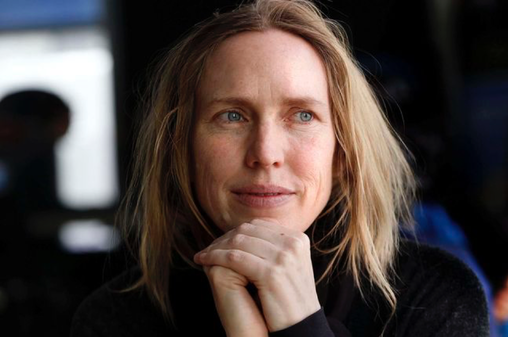An Interview with Miriam Toews
By Becky Zhang, Pomona '22
|
Miriam Toews is an award-winning Canadian novelist. Raised in a Mennonite community in Steinbach, Manitoba, Toews has written numerous novels as well as Swing Low, a memoir written from her late father’s perspective. Much of Toews’ work is influenced by her Mennonite upbringing and identity, with her most recent book, Women Talking, grappling with the abuse inflicted upon women in a remote Mennonite colony in Bolivia.
|
You’ve written fiction and memoir. How do you see them in relation to one another, and what draws you to each?
I’m always drawn to fiction. That’s the natural, first thing where my mind goes. Creating fictional narrative is the way that makes the most sense to me of ordering my own experience and thoughts and feelings. Within that realm, it’s the novel—that specific art form. I don’t write short stories or poetry, although I read them, and I wish that I could do it. I know of writers who obviously do both or all three. But for me, it’s usually the messy, novel form. Somebody once said that the novel is the messiest form, and something about that appeals to me: the ability to take as many words or pages to tell a story, and the freedom of it, meandering off and back again. There’s just something inherently within the novel form that appeals to me.
Swing Low is a hybrid, in a sense, because everything in the book—a memoir of my father, you could call it—happened, but of course it’s written from my father’s point of view, and I’m not my father. I had to extrapolate his thoughts and feelings from what I knew of him. There was a lot of research involved in that, too: talking to other family members and his friends and colleagues, et cetera, to understand him.
When writing more memoir-based pieces, how do you toe the line between fiction and nonfiction?
It’s true that at first when the book came out, people were shelving it in nonfiction, in memoir, and other people were saying it was a form of fiction. Both are right: it’s its own kind of thing. I guess that’s the beauty of fiction and calling something fiction: you have the freedom to make things up. You can write everything that is true, but you can also make things up. With memoir or nonfiction, you can’t really make things up. I’m very conscious of that; I got a journalism degree, and I was writing journalism, always with this urge to make things up, to embellish, and to create more character and setting, more novelistic things. I realized I couldn’t do that within that form.
Your time in journalism involved making radio documentaries and gathering interviews, getting other people’s perspectives. How have you taken those skills and translated them into your writing, for instance in your most recent book Women’s Talking?
Making those radio documentaries, you have to listen to people and you have to be patient. You have to listen for a long time, to find out what is the story there. What is this person saying? What is the need? What is the question, what is this person really attempting to say, and where is the story? That’s important for writing fiction or anything at all: the ability to stand back, to listen, to observe, and to document. To step outside of what’s happening, to be an outsider, so that you can more clearly see what’s happening around you.
For me, quotes in journalism would always bring the story to life. And the same thing applies to fiction, bringing a character to life. To write dialogue, you have to listen to the way people speak, what they’re saying, what they’re talking around—not even necessarily something direct. That’s a little different from journalism, where you’re looking not for the metaphors, necessarily, nor for the indirect dialogue, but for something that’s clear and factual.
Going from journalism to fiction, the common denominator was the need to step outside of the story to observe, witness, and document it.
What are your thoughts on relying on plot to ground a piece, versus dialogue, themes, and other subtler tensions that may not necessarily culminate in a conventional linear plot structure?
Plot’s not really my thing. Some of my books have more plot points than others, although most of the time my books are shelved—there’s one tiny little shelf at my local bookstore labelled—as “Plotless Fiction.” And that’s my favorite shelf to go to. That’s where I’m immediately drawn to.
A lot happens in people’s minds and hearts and souls. And that is stuff happening, though not in the conventional sense. So, it’s always characters that I start with. I think of a character and what that particular character is up against.
Virginia Woolf wrote somewhere that “we [creative women] think back through our mothers.” Your New Yorker profile depicts your close relationship with your mother and details your respective “Velvet Revolutions,” in which you each rebelled against community expectations. Can you speak on the ways in which your unique relationship with your mother has influenced your writing?
Hugely. I’ve been thinking more and more about what my mother means to me, aside from the obvious that she’s my mother and she raised me. I think that she’s sort of been, and continues to be, the real love of my life. The way she approached living in the community that she grew up in, this patriarchal, authoritarian, religious, conservative community. She was a free spirit and an independent thinker, and she longed for the outside world. She really raised me and my sister in this way: to be outspoken and to be brave, to understand that there would be consequences and that we could handle that.
It wasn’t easy—certainly we all suffered. I’ve written about her in so many different ways in all of my books. She’s a real person that my world revolves around a lot. She’s become a character. She embodies those sorts of things, that face-to-face struggle and pain and loss and grief. She embodies it all.
Some view the act of writing about your Mennonite upbringing and publishing these works as a brave act, too, especially given sensitivity and potential backlash to topics covering such a closed, restrictive experience. What factors have influenced your decision to do so?
I don’t think of it as brave—I think of it as a need. It’s something I need to do in order to make sense of that world. I’m fascinated by it, repelled by it, I miss it, it angers me… I have so many questions about it. The people that are closest to me are Mennonites.
It’s a need, a need to explore that world and to make sense of it. And to expose and talk about the injustices of it, that culture of control, how girls and women are treated, the expectations of them in this world. The guilt, the punishment, that form of fundamentalism and authoritarianism. I feel I have an obligation to drag all of this stuff into the light. It becomes less fearsome when we can talk about it and look at it.
I feel hope for my community, that there’s a possibility of change, of actual Christian love and action even within the context of the faith. There is that real criticism of what I do by male religious elders in the community, Menonnite men in general, but there’s also a lot of support. That disapproval is something I’ve grown up with. I grew up with my parents’ encouraging my sister and me to speak out, despite the consequences. It’s not easy, but I won’t stop having questions about my community in hope that it can change and become something genuinely good.
Much of Swing Low concerns your father’s compulsion to record things on paper, from travel logs to teaching notes to familial sentiments he wants to remind himself of. How has your father’s habit of writing things down impacted your own interest in and approach to writing?
Hugely. He was a writer, constantly. Just now, actually, my mother and I were going through a ton of notebooks that my father kept. All of those notebooks had all of these details—not a lot of personal stuff—and it was just incredible. They were so telling and evocative, and that was hugely impactful. My father always encouraged me to write and document things. On family trips we would constantly have to stop and he would rewrite things that were on plaques. We didn’t have cameras or anything like that in our community, so there was a lot of writing going on when I was growing up.
Writing was also one of those things that you could do covertly within our community. Any other art form was considered sinful: movies, dancing, theater, whatever it was. Writing was something that you could do by yourself in your room.
What was the most challenging thing about trying to step into your father’s shoes in writing Swing Low?
We were really very different people. He was a formal, somber, methodical, organized, perfectionist. His wit was very dry, he didn’t swear, he wasn’t critical of other people, and he didn’t gossip. He toed the line in that community. He wasn’t critical of the Mennonite community and he really believed in it. He was a devout Christian believer, which I’m not. To try and take all of that and create that character was the biggest challenge.
What was the most surprising thing about writing a memoir from your father’s perspective?
Rediscovering my father’s tenderness for me. Realizing how much he had loved and believed in me, in my outspokenness, in my rebelliousness. He couldn’t do it himself and he didn’t want to do it himself, and it was that quality that he loved in my mother and in me and my sister. In writing the book, I was comforted realizing how much he had respected us.
I also became aware of how his illness had really baffled me and angered me when I was younger, before I came to slowly understand what it was. His illness meant that he was often away from us, and that hurt me deeply. Writing the book also made me feel bad about those times I was angry and didn’t attempt to understand him. I wish that I had spoken to him more, learned more from him about his world and life. Writing about a person who’s gone can do that—like, “Oh, why didn’t I?” It’s something I try to do with my mother now too. But it’s not really something you do as a young person. I was pretty young when my father died. You don’t think that you won’t have a lot of time to do that, to talk to them, in the future.
Do you feel that there is any separation between your Mennonite identity and your writing, or are the two intrinsically connected?
I think they’re intrinsically connected. I used to think that they weren’t, but somewhere along the way I’ve come to understand that they are. Even when I’m not writing overtly about Mennonites, especially in my earlier books, my characters, even if they don’t have Mennonite names, are Mennonites in my mind. My sister and I were the first generation to leave the community since the 1500s, when the Mennonites first broke up from the larger Catholic community in Ireland. It was all so incestuous, so closed, so formative. It had that effect on me as well, and it took and continues to take effort to be in the world and meet other people, to think and read and to experience the world outside that community. It takes effort for other things to come into my consciousness and into my writing.

